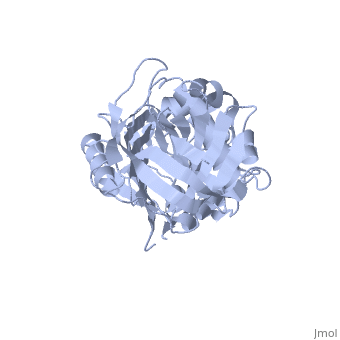We apologize for Proteopedia being slow to respond. For the past two years, a new implementation of Proteopedia has been being built. Soon, it will replace this 18-year old system. All existing content will be moved to the new system at a date that will be announced here.
1jti
From Proteopedia
(Difference between revisions)
| (13 intermediate revisions not shown.) | |||
| Line 1: | Line 1: | ||
| - | [[Image:1jti.gif|left|200px]] | ||
| - | + | ==Loop-inserted Structure of P1-P1' Cleaved Ovalbumin Mutant R339T== | |
| - | + | <StructureSection load='1jti' size='340' side='right'caption='[[1jti]], [[Resolution|resolution]] 2.30Å' scene=''> | |
| - | + | == Structural highlights == | |
| - | + | <table><tr><td colspan='2'>[[1jti]] is a 2 chain structure with sequence from [https://en.wikipedia.org/wiki/Gallus_gallus Gallus gallus]. Full crystallographic information is available from [http://oca.weizmann.ac.il/oca-bin/ocashort?id=1JTI OCA]. For a <b>guided tour on the structure components</b> use [https://proteopedia.org/fgij/fg.htm?mol=1JTI FirstGlance]. <br> | |
| - | + | </td></tr><tr id='method'><td class="sblockLbl"><b>[[Empirical_models|Method:]]</b></td><td class="sblockDat" id="methodDat">X-ray diffraction, [[Resolution|Resolution]] 2.3Å</td></tr> | |
| - | + | <tr id='resources'><td class="sblockLbl"><b>Resources:</b></td><td class="sblockDat"><span class='plainlinks'>[https://proteopedia.org/fgij/fg.htm?mol=1jti FirstGlance], [http://oca.weizmann.ac.il/oca-bin/ocaids?id=1jti OCA], [https://pdbe.org/1jti PDBe], [https://www.rcsb.org/pdb/explore.do?structureId=1jti RCSB], [https://www.ebi.ac.uk/pdbsum/1jti PDBsum], [https://prosat.h-its.org/prosat/prosatexe?pdbcode=1jti ProSAT]</span></td></tr> | |
| - | + | </table> | |
| - | + | == Function == | |
| - | + | [https://www.uniprot.org/uniprot/OVAL_CHICK OVAL_CHICK] Non-inhibitory serpin. Storage protein of egg white.<ref>PMID:6749856</ref> <ref>PMID:3732511</ref> | |
| - | + | == Evolutionary Conservation == | |
| + | [[Image:Consurf_key_small.gif|200px|right]] | ||
| + | Check<jmol> | ||
| + | <jmolCheckbox> | ||
| + | <scriptWhenChecked>; select protein; define ~consurf_to_do selected; consurf_initial_scene = true; script "/wiki/ConSurf/jt/1jti_consurf.spt"</scriptWhenChecked> | ||
| + | <scriptWhenUnchecked>script /wiki/extensions/Proteopedia/spt/initialview03.spt</scriptWhenUnchecked> | ||
| + | <text>to colour the structure by Evolutionary Conservation</text> | ||
| + | </jmolCheckbox> | ||
| + | </jmol>, as determined by [http://consurfdb.tau.ac.il/ ConSurfDB]. You may read the [[Conservation%2C_Evolutionary|explanation]] of the method and the full data available from [http://bental.tau.ac.il/new_ConSurfDB/main_output.php?pdb_ID=1jti ConSurf]. | ||
| + | <div style="clear:both"></div> | ||
| + | <div style="background-color:#fffaf0;"> | ||
| + | == Publication Abstract from PubMed == | ||
| + | Ovalbumin is a member of a superfamily of serine proteinase inhibitors, known as the serpins. It is, however, non-inhibitory towards serine proteinases, and lacks the loop insertion mechanism common to the serpins due to unknown structural factors. Mutant ovalbumin, R339T, in which the P14 hinge residue is replaced, was produced and analyzed for its thermostability and three-dimensional structure. Differential scanning calorimetry revealed that the mutant ovalbumin, but not the wild-type protein, undergoes a marked thermostabilization (DeltaT(m)=15.8 degrees C) following the P1-P1' cleavage. Furthermore, the crystal structure, solved at 2.3 A resolution, clearly proved that the P1-P1' cleaved form assumes the fully loop-inserted conformation as seen in serpin that possess inhibitory activity. We therefore conclude that ovalbumin acquires the structural transition mechanism into the loop-inserted, thermostabilized form by the single hinge mutation. The mutant protein does not, however, possess inhibitory activity. The solved structure displays the occurrence of specific interactions that may prevent the smooth motion, relative to sheet A, of helices E and F and of the loop that follows helix F. These observations provide crucial insights into the question why R339T is still non-inhibitory. | ||
| - | + | Loop-inserted and thermostabilized structure of P1-P1' cleaved ovalbumin mutant R339T.,Yamasaki M, Arii Y, Mikami B, Hirose M J Mol Biol. 2002 Jan 11;315(2):113-20. PMID:11779232<ref>PMID:11779232</ref> | |
| + | From MEDLINE®/PubMed®, a database of the U.S. National Library of Medicine.<br> | ||
| + | </div> | ||
| + | <div class="pdbe-citations 1jti" style="background-color:#fffaf0;"></div> | ||
| - | == | + | ==See Also== |
| - | + | *[[Ovalbumin|Ovalbumin]] | |
| - | + | == References == | |
| - | + | <references/> | |
| - | + | __TOC__ | |
| - | + | </StructureSection> | |
| - | == | + | |
| - | + | ||
[[Category: Gallus gallus]] | [[Category: Gallus gallus]] | ||
| - | [[Category: | + | [[Category: Large Structures]] |
| - | [[Category: Arii | + | [[Category: Arii Y]] |
| - | [[Category: Hirose | + | [[Category: Hirose M]] |
| - | [[Category: Mikami | + | [[Category: Mikami B]] |
| - | [[Category: Yamasaki | + | [[Category: Yamasaki M]] |
| - | + | ||
| - | + | ||
| - | + | ||
| - | + | ||
| - | + | ||
Current revision
Loop-inserted Structure of P1-P1' Cleaved Ovalbumin Mutant R339T
| |||||||||||


